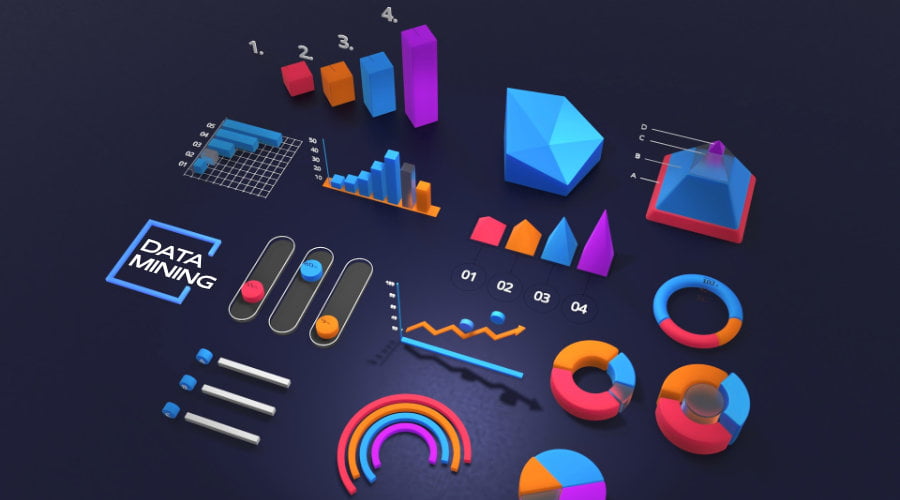
Web scraping has become an invaluable tool for investors, hedge funds, asset managers, trading firms, and finance companies looking to improve their business operations and enhance sales growth through financial data.
You can access valuable data from various online sources by leveraging web scraping techniques. This allows you to identify trends, make informed decisions, and develop successful investment strategies.
Let’s discover the advantages, applications, web scraping and data mining techniques in finance.
Advantages of Financial Data Web Scraping

Access to real-time data
As a financial professional, web scraping helps you gather real-time information from websites, news portals, social media platforms, and finance databases. This financial data includes stock prices, market news, analyst reports, company financials, economic indicators, and more. You can use data scraping services or tools to collect up-to-date information essential for making timely and accurate investment decisions.
more competitiveness
Web scraping empowers your business to gain a competitive edge by acquiring unique and proprietary financial datasets. Also, extracting and analysing alternative data sources, such as social media sentiment, consumer reviews, or supply chain data, can provide insights into market trends and consumer behaviour not readily available through traditional sources.


Do market research & analysis
A scalable web scraping tool is ideal for gathering big data related to market research, competitor analysis, and sentiment analysis. Your financial service agency can then use data mining to monitor online discussions, customer reviews, and social media trends to gauge public sentiment and adjust your strategies accordingly.
investment risks Management
Financial web scraping can help your asset management firm handle risk by monitoring regulatory changes, collecting legal proceedings data, and discovering industry-specific news. Automated web scraping can ensure compliance with regulatory requirements and help you identify potential risks associated with your client’s investments.

Web Scraping Applications in Finance
Investment research
Web scraping provides a wealth of information for investment research. You can identify investment opportunities, track company performance, and assess market trends by scraping financial news websites, market data platforms, and analyst reports.
Portfolio management
As an asset manager, you can use web scraping to collect data on your investment performance, monitor market movements, and rebalance portfolios based on real-time information. Scraping financial statements, earnings reports, and SEC filings helps assess the financial health of companies in the portfolio.
Algorithmic trading
Web scraping is crucial for developing and refining algorithmic trading strategies. Gathering historical and real-time market data, such as stock prices, order book data, and trade volumes, allows your firm to create sophisticated models that automate trading decisions.
Risk assessment
As explained above, web scraping can help you monitor news websites, government announcements, and social media platforms to identify potential risk factors for your investments.
Finance Arbitrage
Arbitrage strategies in finance help you generate profits with minimal (or zero) risk by leveraging price discrepancies in different financial markets or instruments.
Financial Data Web Scraping for Arbitrage
Web scraping can be crucial in identifying and capitalising on arbitrage opportunities in the following ways.
Data aggregation
Web scraping enables data collection and aggregation from various financial sources, such as stock exchanges, trading platforms, and financial news websites. As a trader, you can use web scraping and data mining to extract data from multiple sources and compare prices, spreads, and other relevant information across different markets in real-time.
Price discovery
Web scraping allows your trading company to monitor prices across multiple platforms or exchanges simultaneously. By analysing them, you can identify instances where an asset is mispriced or where price discrepancies exist between different markets. This information can be leveraged to execute profitable arbitrage trades.
Fast and efficient execution
When combined with automated trading systems, web scraping can help you execute arbitrage strategies with exceptional speed and efficiency, reducing the risk of missing out on profitable trades.
Cross-market analysis
Web scraping and data mining for financial data analysis across different markets, asset classes, or geographic regions allow you to identify arbitrage opportunities that arise from differences in pricing, interest rates, or other market factors.
Alternative data integration
Web scraping allows the integration of alternative data sources into arbitrage strategies. By scraping data from social media platforms, news articles, or economic indicators, your company can gain insights into market sentiment, news events, or macroeconomic factors that may impact prices and create arbitrage opportunities.
Risk management
Big-data scalable web scraping can assist you in managing and mitigating risks associated with arbitrage strategies, thanks to constant monitoring and analysis of regulatory changes, market news, or economic indicators.
Best Financial Data Sources
You can work more efficiently and profitably in finance, asset management, and trading by leveraging web scraping and data mining. But you need the proper data sources.

Financial Data Websites
Yahoo Finance
Yahoo Finance offers a broad range of financial data, including stock quotes, historical prices, financial statements, news articles, and market analysis. It covers global markets and provides detailed information on individual stocks, indices, and commodities.
Google Finance
Google Finance provides real-time stock quotes, charts, news, and financial information for various global exchanges. It also offers portfolio tracking tools and customizable market watchlists.
Bloomberg
Bloomberg is a renowned financial news and data platform that covers global markets. It provides real-time stock quotes, financial stories, market analysis, economic indicators, and company profiles. Bloomberg also offers data on bonds, commodities, and currencies.
Reuters
Reuters is a trusted data source of financial news and analysis. It covers global markets, offering stock quotes, company news, market insights, and economic indicators. Reuters also provides industry-specific info and commentary.
Financial Times
The Financial Times is a leading international newspaper that covers financial news, market analysis, and economic trends. It provides in-depth articles, opinion pieces, and market data for various asset classes, including stocks, bonds, and currencies.
SEC EDGAR
The U.S. Securities and Exchange Commission’s Electronic Data Gathering, Analysis, and Retrieval (EDGAR) system provides access to regulatory filings, including annual reports, quarterly filings, and other financial statements for publicly traded companies in the United States.
CNBC
CNBC is a popular financial news channel also available online. It covers global markets, providing real-time stock quotes, analysis, and financial news articles. CNBC also features interviews with industry experts and market commentators.
Investing.com
Investing.com is a financial portal that offers real-time stock quotes, charts, news, and analysis for global markets. It covers many asset classes, including stocks, commodities, bonds, and cryptocurrencies.
MarketWatch
MarketWatch provides financial news, analysis, stock quotes, and market data. It offers insights on stocks, bonds, currencies, commodities, personal finance advice and investing tools.
Seeking Alpha
Seeking Alpha is a platform for crowd-sourced investment research and analysis. It offers articles, news, and opinion pieces from investors and industry experts on several stocks and market trends.
Remember to review and comply with the terms of service and any relevant legal requirements when scraping data from these websites.
Alternative Data Sources
Alternative data in finance refers to non-traditional data sources that provide unique insights into market trends, consumer behaviour, and industry dynamics.
Here are some websites and other data sources commonly used for alternative data in finance.
Social media platforms
Platforms like Twitter, Facebook, and LinkedIn offer a wealth of data you can scrape for sentiment analysis, brand monitoring, and consumer behaviour analysis. Social media data can provide insights into market sentiment, product reviews, and consumer trends.
Web forums and discussion boards
Websites like Reddit, Quora, and specialised forums related to finance and investing can provide valuable insights from user discussions. Monitoring these platforms can help identify emerging trends, sentiment shifts, and investment opportunities.
E-commerce platforms
Websites like Amazon, eBay, and Alibaba generate massive amounts of data on product sales, customer reviews, and pricing dynamics. Scraping data from e-commerce platforms can provide insights into consumer preferences, product demand, and pricing strategies.
News aggregators and news APIs
Platforms like Google News, Bloomberg, and Reuters offer RSS feeds or APIs to access news articles, press releases, and market updates. Integrating these APIs allows real-time scraping of financial news, which your company can exploit for sentiment analysis and event-driven trading strategies.
Satellite imagery and geolocation data
Companies like Orbital Insight and Descartes Labs leverage satellite imagery and geolocation data to monitor activities, such as retail foot traffic, shipping volumes, and energy consumption. This data can provide insights into economic indicators and supply chain trends.
Web scraping of job postings
You can scrape job posting platforms like Indeed and LinkedIn to gather insights into hiring trends, job market dynamics, and company expansion plans. Analysing job postings can offer indicators of industry growth and potential investment opportunities.
Government data sources
Government agencies, such as the U.S. Census Bureau, Eurostat, and data.gov, often provide open data portals with information on economic indicators, demographics, and trade data you can use to get macroeconomic insights.
Web scraping of financial statements
Publicly traded companies must file financial statements, including annual reports, 10-K filings, and earnings releases. You can scrape websites, such as SEC EDGAR or company investor relations pages, to gather financial data for analysis.
IoT sensors and devices
Internet of Things (IoT) devices generate vast amounts of data related to energy consumption, weather patterns, transportation, and more. Companies specializing in IoT data collection, such as Aclima and Plume Labs, offer access to datasets that can provide insights into economic activity and environmental factors. They are central elements in managing smart cities.
Industry-specific platforms web scraping
For example, scraping real estate listings or property databases can provide insights into housing market trends. This is essential when you want to develop real-estate arbitrage strategies.
Data Sources for Financial Assets Prices
For effective finance arbitrage, asset prices are essential. So, where can you find and collect the data? Here are the top ten data sources providing comprehensive and reliable financial data.
Bloomberg Terminal
The Bloomberg Terminal is a widely used professional platform that provides real-time and historical financial market data. It covers various asset classes, including equities, fixed income, commodities, currencies, and derivatives.
Refinitiv Eikon
Refinitiv Eikon is a comprehensive financial information platform that offers real-time market data, news, and analytics. It covers most asset classes and provides in-depth pricing information and historical data.
Interactive Brokers
Interactive Brokers is a well-known brokerage firm that offers an API (Application Programming Interface) that provides access to real-time market data, historical prices, and trading functionality. It covers multiple exchanges and asset classes.
Alpha Vantage
Alpha Vantage is a free and reliable API provider that offers real-time and historical market data for stocks, ETFs, cryptocurrencies, and more. It provides pricing information, technical indicators, and fundamental data.
Intrinio
Intrinio is a financial data platform that offers a wide range of data feeds, including real-time and historical pricing data for stocks, options, futures, and forex. It provides comprehensive market data and analytics tools.
Xignite
Xignite is a cloud-based market data provider that offers a vast range of financial data feeds, including real-time and historical pricing data for equities, bonds, commodities, and currencies. It also provides APIs for easy integration into applications.
Quandl
Quandl is a financial data platform offering access to extensive financial and economic datasets. It provides stocks, futures, options, and commodities historical pricing data from various exchanges.
Yahoo Finance
Yahoo Finance is a popular free financial website that offers real-time and historical pricing data for stocks, ETFs, cryptocurrencies, and more. It provides charts, news, and fundamental data.
Investing.com
Investing.com is a comprehensive financial website that provides real-time pricing data for various asset classes, including stocks, bonds, commodities, and currencies. It offers charts, technical analysis tools, and financial news.
Google Finance
Google Finance provides real-time and historical pricing data for stocks, ETFs, and major indices. It offers interactive charts, financial news, and basic company information.
These data sources offer both real-time and historical prices of multiple asset classes. You can extract data through APIs, data platforms, or directly from their respective websites using custom web scrapers or a self-service cloud-based data scraping tool.
Ensure to review the terms of service and any associated costs when using these data sources for finance and trading purposes.
Data Sources for Cross-Market Analysis
You can perform financial cross-market analysis by combining Bloomberg Terminal, Refinitiv Eikon, Investing.com, and Yahoo Finance with the following data sources.
Datastream
Datastream, a product by Refinitiv, is a global financial database that provides access to historical financial data for equities, fixed income, commodities, and indices from various markets. It enables data comparison and analysis from different markets and asset classes.
Morningstar Direct
Morningstar Direct is a research and analysis platform that offers access to extensive data on mutual funds, ETFs, stocks, and more. It helps you in cross-market analysis by comparing performance, valuation metrics, and portfolio holdings across different markets and regions.
Thomson Reuters Eikon
Thomson Reuters Eikon is a financial information platform that provides real-time and historical data across multiple asset classes and markets. It offers comprehensive tools for cross-market analysis, including charting, news, and analytics.
Financial Times Markets Data
Financial Times Markets Data offers interactive charts, performance metrics, and cross-market analysis tools.
World Bank Data
The World Bank Data platform provides access to 6,490 financial datasets, including databases, pre-formatted tables, reports, and other economic and financial resources from countries worldwide. It offers indicators such as GDP, inflation, interest rates, and trade data, enabling cross-market analysis at the macroeconomic level.
Central Banks
Central bank websites often provide valuable economic and financial data for their respective countries. They offer reports, publications, and statistics, including interest rates, monetary policies, and economic indicators.
By utilising these data sources, you can gather and analyse information from different markets and asset classes to perform cross-market analysis in finance. It’s important to consider the data’s availability, reliability, and coverage when conducting such analysis.
Data Sources for Risk Management
You can use various data sources to assess and mitigate risks. Here are some key data sources commonly used for risk management in finance.
Historical price data
Historical price data obtained from reliable sources, such as financial exchanges or data providers, is essential for understanding the price movements of various assets. You can identify potential risks associated with volatility, liquidity, and market trends by analysing historical price patterns.
Volatility indices
Volatility indices, such as the CBOE Volatility Index (VIX), provide insights into market volatility levels and expectations. Monitoring volatility indices can help evaluate the potential risks and uncertainties associated with market conditions and adjust arbitrage strategies accordingly.
Options and derivatives data
Options and derivatives data, including implied volatility levels and options pricing data, can provide valuable information about market sentiment and expected price movements. Analysing options data can assist your trading company in evaluating the risk exposure and potential profitability of arbitrage strategies.
News and event data
Monitoring financial news and event data from reputable sources helps identify events that may impact the markets and specific assets. News sentiment analysis can provide insights into market expectations and help manage risks associated with unexpected events or announcements.
Regulatory filings and disclosures
You can scrutinise quarterly reports, annual reports, and other financial statements filed by publicly traded companies to get insights into the financial health, risks, and performance of businesses involved in arbitrage strategies.
Credit rating agencies
Data from credit rating agencies, such as Moody’s, Standard & Poor’s, and Fitch Ratings, can offer information on the creditworthiness and risk profile of counterparties, debt instruments, and other financial products. This data is crucial for assessing credit risk in arbitrage strategies.
Economic indicators
Economic indicators, such as GDP growth rates, inflation rates, employment data, and interest rate changes, can impact market conditions and asset prices. Monitoring and analysing economic indicators can help gauge macroeconomic risks and adjust arbitrage strategies accordingly.
Risk management software and platforms
Dedicated risk management software and platforms provide tools and analytics to assess, monitor, and manage risks associated with arbitrage strategies. These platforms often integrate data from multiple sources, providing real-time risk metrics, portfolio analysis, and stress-testing capabilities.
Counterparty and market data
Data on counterparties’ financial stability, creditworthiness, and trading activity can be crucial for assessing and managing counterparty risks in financial arbitrage. Market data on liquidity, order book depth, and trading volumes can help gauge the arbitrage trade market risks.
Internal trade and portfolio data
Collecting and analysing internal trade and portfolio data, including transaction records, trade execution details, and performance metrics, can help identify risk exposures, track performance, and optimise arbitrage strategies. Internal data is valuable for customised risk management tailored to a specific organisation’s needs.
Make sure data sources are accurate, timeliness, and reliable. This is vital for better investment risk management. Additionally, employ robust risk models and stress testing methodologies, and incorporate risk management best practices to mitigate risks and protect capital effectively.
Web Scraping and Finance Data Mining Techniques
Scraping financial data involves using automated methods to extract information from websites, APIs, or other sources. For effective results, you must integrate web scraping with data mining.

Finance data mining helps you extract meaningful patterns, insights, and knowledge from large volumes of financial data. It requires advanced computational techniques and statistical algorithms to discover hidden relationships, trends, and predictive patterns within financial datasets.
Finance data mining is critical in various areas, including risk management, investment analysis, fraud detection, and portfolio optimisation. Here are five ways to extract and leverage financial data.
HTML parsing
HTML parsing involves extracting data from HTML documents using libraries like BeautifulSoup or Scrapy. Financial data embedded in websites, including stock prices, financial statements, and news articles, can be scraped using this technique.
API integration
Many websites provide APIs (Application Programming Interfaces) that allow access to their data in a structured format. As a financial professional, you can use APIs to retrieve real-time stock prices, economic indicators, and other financial data.
Web automation
Automation tools like Selenium enable web scraping by simulating user interactions with websites. This technique is useful for scraping data from websites requiring login credentials or having complex user interfaces.
Text mining and sentiment analysis
You can hire data experts to apply Natural Language Processing (NLP) techniques to scrap data for sentiment analysis, topic modelling, and extracting valuable insights from textual sources like news articles, social media posts, and customer reviews.
Machine learning and predictive analytics
By combining web scraping with Machine Learning (ML) algorithms, your investment company can develop predictive models for forecasting stock prices, identifying market trends, or detecting anomalies in financial data.
Your Next Step
Contact us to find the best financial data web scraping and data mining solutions and discover how to integrate them with your business’s financial needs and workflow.
Book a free consultation with data experts
Improve your investments’ ROI
Extract and manage financial data in the best way possible.
Disclaimer: Always respect user privacy and copyright, follow ethical data scraping practices, and abide by the terms and conditions of the websites or platforms you’re scraping data from, as unauthorized data extraction may lead to legal or privacy issues. Therefore, ensure that your data collection and analysis methods are compliant. Furthermore, data can be noisy, unstructured, and constantly changing. Therefore, use a tool or service that can handle the volume and variety of data from multiple web sources. This article is for information purposes only and not intended as legal advice. Consult a lawyer for complete knowledge of the local and international laws.

















